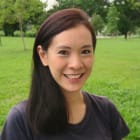At her mother-in-law’s bedside, dementia sparked an unexpected bond: 'I felt closer to her than before'
Over sentimental Teresa Teng ballads and long afternoon chats, a quiet bond blossomed between Fortuna Tan and her late bed-bound mother-in-law in the final stages of dementia.
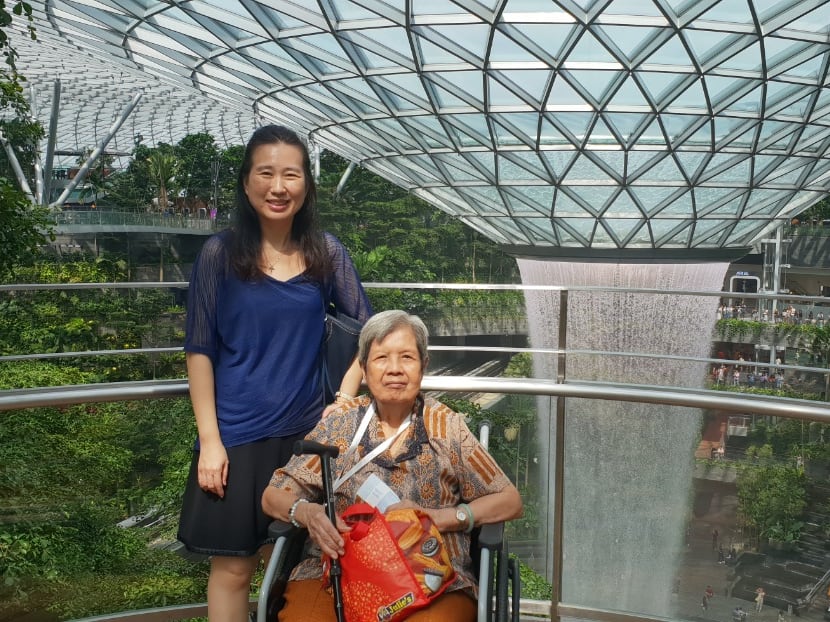
Fortuna Tan (left) was the primary caregiver to her mother-in-law Wong Ngun Siew, who suffered from dementia and stroke. (Photo: Fortuna Tan)

This audio is generated by an AI tool.
Whenever Teresa Teng’s ballad The Moon Represents My Heart plays, Fortuna Tan thinks of, not her husband, but her mother-in-law Wong Ngun Siew.
Wong died of pneumonia last year, at the age of 92. She had suffered from dementia for seven years. Tan accompanied her through the last four years of her life when she was bedridden after a stroke, assisting with feeding, bathing and diaper changes. They also spent hours listening to oldies together.
It was during those long quiet afternoons that Wong opened up to her daughter-in-law, sharing poignant memories of her childhood, marriage, struggles and hopes – many of which she may not have mentioned to her own children.
Through dementia’s trials, their relationship blossomed.
“I saw her in a different light and felt closer to her,” said the 53-year-old Tan. “That’s probably why I was willing to care for her till the end.”
WHEN STROKE STRUCK
Wong had six children, and lived with her youngest son at her own home. One of her daughters took care of her medical needs. In 2017, after being diagnosed with vascular dementia, she also began attending daycare.
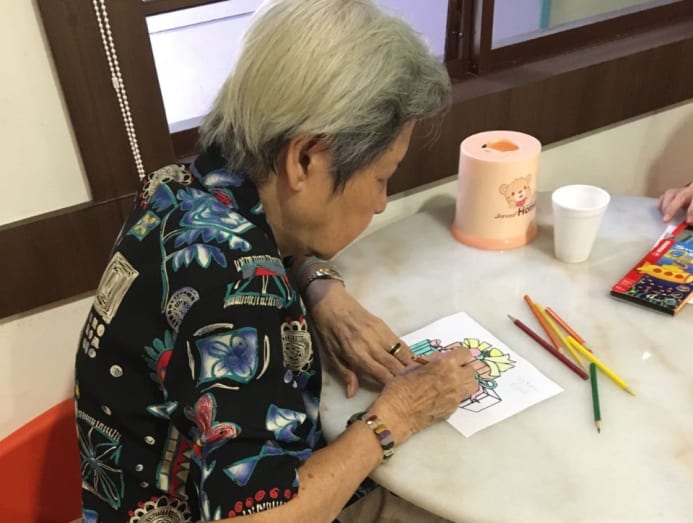
However, in 2020, Wong suffered a stroke.
“After our regular Saturday family dinner, we watched TV together. Suddenly, she grabbed my daughter’s hand and leaned on her. We thought she was going to sleep. But her face changed – one side drooped. That’s when we realised she was having a stroke,” Tan recalled.
At first, doctors thought Wong would not pull through. But her condition stabilised and she was eventually transferred to a community hospital.
That was during the early days of the pandemic, and the hospital only allowed two visitors per patient. One of them had to be Wong’s helper, who assisted her with daily needs.
Tan’s husband wanted to be the second caregiver, but he could not step away from work for extended periods. That was when Tan, a stay-at-home mother who had given up her career as a data analyst many years ago, stepped up. Her two children were then aged 18 and 21.
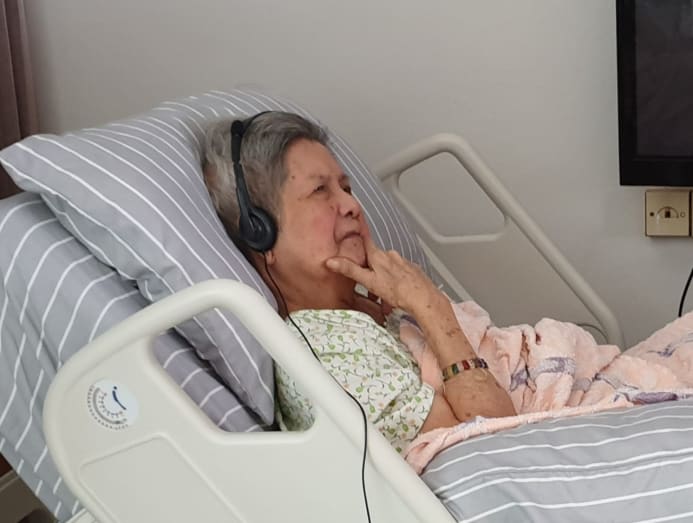
“I did it out of love for my husband,” Tan told CNA Women. “I wanted to support him since I was more equipped in dementia care.” She had helped to care for her grandmother, also a dementia patient, from 2017 to 2019 when she died.
A FOUR-YEAR CAREGIVING JOURNEY
After the stroke, Wong could not move her left side. Bed-bound, she required diapers and had to be fed, changed, bathed, and transferred from bed to geriatric chair and back daily.
Wong already had her helper to care for her, but it was often a two-person job.
When the helper was cleaning Wong after she had passed motion for instance, she would wriggle a lot and Tan had to help hold her. She had to do the same when Wong had constipation, so that the helper could insert rectal suppositories to aid her bowel movement.
Some may baulk at the stench but Tan said it did not bother her.
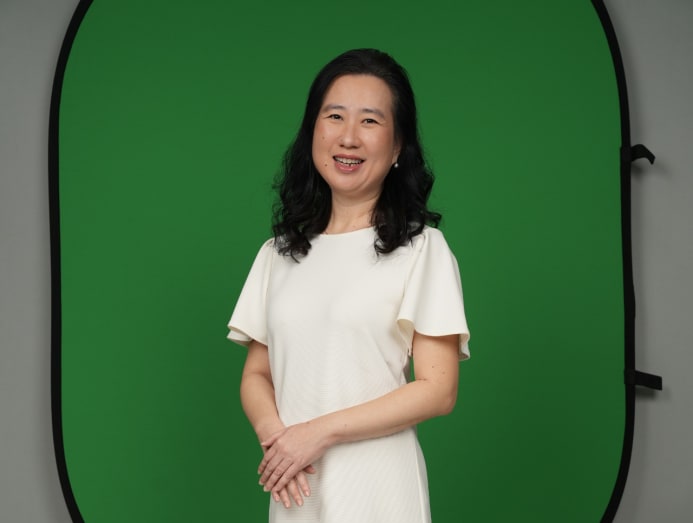
Because dementia often requires round-the-clock care, Tan went to her mother-in-law’s house from Mondays to Wednesdays, staying from lunchtime to around 10pm, to support the helper so that she could get much-needed rest.
From Thursdays to Saturdays, Wong’s other children would step in to support the helper, and on Sunday, Tan and her family would pop by to buy groceries, and check in briefly.
To equip herself, Tan enrolled in a six-month course on dementia care by Peacehaven Jade Circle Acaredemy, an eldercare training centre.
When she was taking care of her grandmother, Tan had watched her gradually lose the ability to speak Mandarin, and subsequently the Teochew dialect. She felt helpless to make her feel cared for and loved.
This time around, she was determined to better equip herself with caregiving skills, communication skills and engagement strategies.
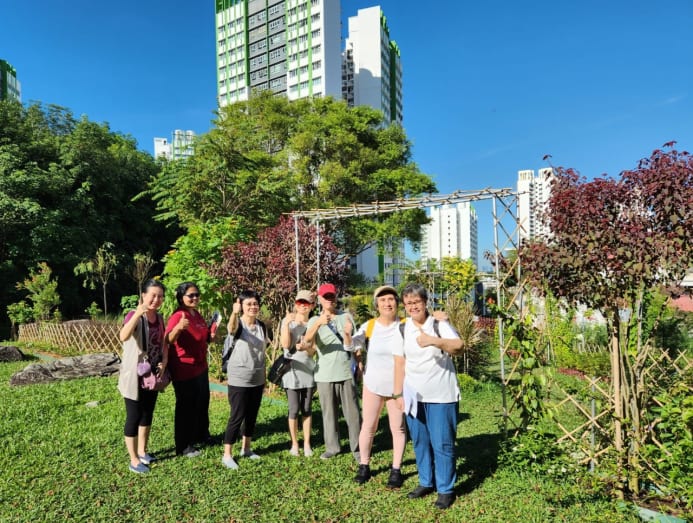
With that knowledge, in 2021, she even started a support group, Caring You, Caring Me, for fellow caregivers in church. The group currently has 10 to 12 members who meet every three months to share knowledge, engage in self-care activities such as garden walks and art therapy, and support one another.
A TAPESTRY OF MEMORIES
One thing Tan’s course taught her was how to engage Wong, as slowing down cognitive decline was a priority. Some days, the duo would simply count to 50, count backwards, then count in Mandarin and Malay.
Tan also created a personalised playlist of Wong’s favourite songs. The duo spent many quiet afternoons just sitting together and listening to the nostalgic tracks of Teresa Teng.
Drifting through the corridors of memory, Wong often found herself lost in the past. Out of nowhere, she would ask, “Where is my mother?” – forgetting that her mother had long since died.
“If I had told her that her mother had died, she might not accept it and would be upset, or she might accept it and be distressed,” Tan said.
Instead, Tan would validate her thoughts by saying: “You are thinking about your mum” and then distract her with further questions.
“I’d say, ‘I don’t know where your mum is, but can you tell me what she looks like? Why are you looking for her?’
“She said, ‘My mum wants me to follow her to the market’. That was how I knew she was recalling the past. So I’ll ask her how old she was,” Tan said.
That was how Wong’s life story unfolded to Tan one memory at a time.
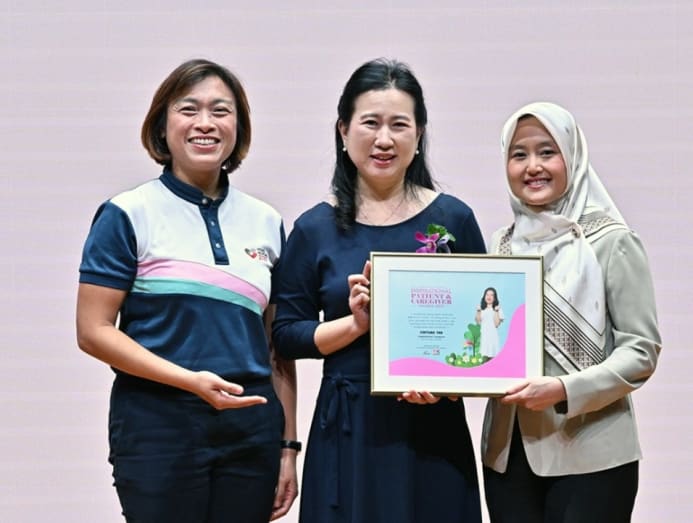
“I found out that my mother-in-law had a hard life growing up. The second oldest among eight children, she had to take care of her younger siblings, and did not get a chance to study.
“She only had the opportunity to go to night school during the Japanese occupation. She later became a seamstress, sewing on-and-off to support the family.
“She met her husband, my father-in-law, during an arranged date with her mother’s friend’s son. After that one-day date, my father-in-law asked, ‘What do you think? Can we be together?’ That’s how they got married without much dating.
“After marriage, she set up a laundry shop to help support the family. I finally understood why she is always concerned about money,” said Tan.
THEIR FINAL JOURNEY TOGETHER
With deeper understanding and empathy, the mother-and-daughter-in-law pair grew closer. But the final journey came with other struggles.
“The last year of her life was really a rollercoaster,” said Tan. Wong gradually lost the ability to eat, and Tan would help to feed her on the helper’s day off.
“That’s very challenging. It took me one hour just to feed her half a bowl of porridge. Sometimes, she would not even open her mouth. Sometimes, she would forget to swallow. I could not give her the second spoonful if she did not swallow, otherwise, she might choke. If the food goes into her lungs, she could develop an infection,” said Tan.
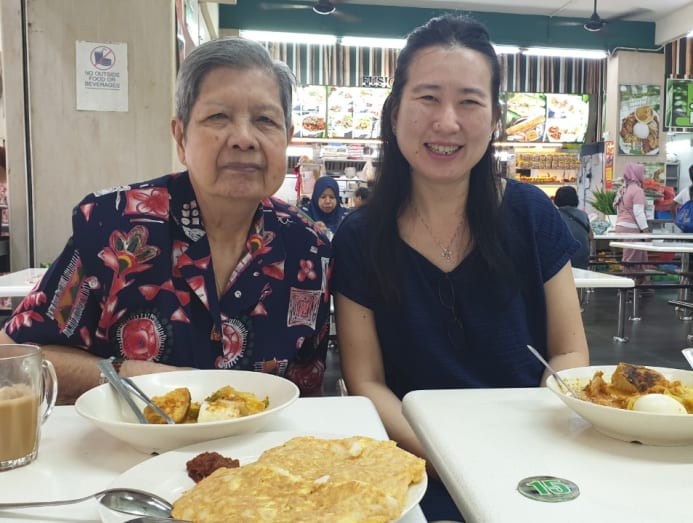
Their chat sessions also ended when Wong lost her speech. “Using the analogy of a library, for dementia, it’s as if over time, one book after another disappears from memory,” Wong said.
Medical issues such as digestive problems, severe constipation and infection also became more frequent, and Wong was hospitalised almost monthly.
“The phone was always beside me, and when the helper called me, I would try my best to tell her what to do, what medication to give and when to send my mother-in-law to the hospital,” said Tan.
“When the helper lacked rest and had a headache, I’d take over,” said Tan. “I didn’t have much social life because I had to be at the hospital most of the time.”
On Dec 4, 2024, Wong made her final trip to the hospital. She was diagnosed with pneumonia. Doctors warned that she had likely come to the end of her journey. One by one, her children and grandchildren visited.
Tan also said her final farewells. “Whenever I had quiet moments with her, I thanked her for the privilege to develop a connection with her during this caregiving journey.”
Her mother-in-law died 10 days later. Though Tan was at the hospital then, she did not go up to the ward, opting to give her husband and Wong’s children more time with her in her final moments.
“Being there in her final moments was not so important to me. When she was living, I had already shown her care and love, and I knew she felt it,” said Tan.
But whenever she hears The Moon Represents My Heart, Tan remembers their bittersweet journey together.
“I won’t say it’s a sad thing. It brings memories of the good moments I had with her,” she said wistfully.
CNA Women is a section on CNA Lifestyle that seeks to inform, empower and inspire the modern woman. If you have women-related news, issues and ideas to share with us, email CNAWomen [at] mediacorp.com.sg.


